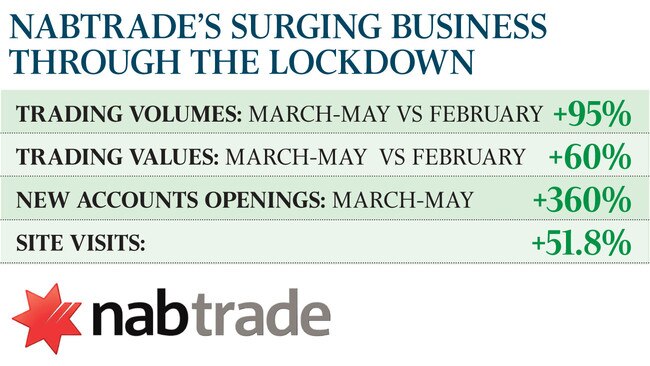
As the sharemarket crash of March recedes in public imagination a new concept is taking hold.
It’s called “the Robinhood generation” which is meant to represent the wave of new investors that have entered the market in recent months looking for bargains. Were they smart investors, or are they set to become cannon fodder in the weeks ahead?
Certainly many institutional investors — who have been standing on the sidelines through the entire recovery — would have you believe that what we have here are lambs for the slaughter, lucky amateurs who were bored in the lockdown and gambled money on speculative stocks.
I’m not so sure about that. A closer look at the situation shows that for every wannabe day trader who threw money at hand sanitiser sensation Zoono, there were also genuine investors who picked up blue chip stocks on a discount of 20 per cent or more from where they are today.
What’s more, the standard narrative out there is that these new arrivals on the market were buying individual stocks, but in fact many of them were actually buying exchange traded funds.
Yes, boring ETFs that have tiny fees and offer exposure to the entire market which at best maximises your exposure to the direction of the market while minimising the risk of picking out a single stock.
In fact the daily turnover of the ASX over the period of the pandemic saw ETF volumes — as a share of the entire volume of ASX — surge from pre-pandemic levels of near 4 per cent to 10 per cent.
Some of the best known ETFs in the market that offer a plain vanilla “mirror-like” exposure to the S&P/ASX 200 witnessed volumes at 10 times their daily average during March, the month where $500m of net ETF inflows were recorded.
Meanwhile, if you look at the volumes of individual stock trades over the same period among retail investors, we actually see a conservative bias towards traditional market leaders.
Of course the day trader favourites are in there — Zoono makes it into the Top 10 in February, the revived biotech Mesoblast (with its promise of COVID treatment) pops up in April and Zip Co makes it into the upper ranks during May.
But the reality, as reflected in the inflows at online trading platforms such as nabtrade, is that the most popular stocks throughout the period are the big four banks — ANZ, Commonwealth, NAB and Westpac — along with the likes of BHP and Woodside.
On the international side the patterns were similar: ETFs such as the Bloomberg Crude Oil ETF are among the most popular along with Microsoft, Apple, Berkshire Hathaway and Disney.

These market leaders are then flanked by speculative moves on special situation stocks such as Tesla (No.1 for four months in a row) and Carnival or Virgin Galactic.
In essence, the lists tell us that Australian private investors are not throwing darts at the lists and hoping for the best.
At home and abroad, the moves by retail investors showed a flair for picking up the best stocks at what turned out to be momentary discounts.
But let’s not get carried away with this tagging of the new entrants to the market as the “Robinhood” generation — the term is misleading, they are not robbing from the rich, rather the term is linked with the popular US app online share trading platform.
Nonetheless, the new wave of investors are clearly comfortable with all aspects of online trading and this is reflected in the rise of related services such as Stake, or to some extent ASX-listed Raiz, which now has 100,000 users.
There is also plenty of evidence the new generation are doing it all from home during what used to be called “working hours”.
Gemma Dale, nabtrade’s director SMSF and investor behaviour, says “many Australians are now embracing the flexibility of working from home and having fewer events and activities to plan for and attend, creating more time to trade during the day — not to mention fewer co-workers looking over their shoulder”.
Dale might have mentioned there is more time to trade during the day when your manager is not looking over your shoulder, either.
But ultimately what we have here is a wave of new investors — online first-time broker applications have tripled over the past three months.
Yes, they have had a good start, but the evidence strongly suggests they were doing what good fund managers are supposed to do.
Whatever they do next or whatever happens next, they are in a better position than someone who was petrified holding huge amounts of cash as the market recovered or worse still selling into the panic of March and April.
What’s more, even if we do get another sell-off — and of course there is another one coming, it is only a matter of time — the point is that these newcomers have fortified their investment position so far this year.
They have a bigger cushion to sustain any losses than many professional investors — cut to the chase they have done well and taken less risks than many at the big end of town will concede.






